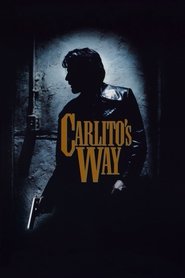De Palma seems to have reined in most of his usual excesses in service of an Al Pacino character study and 1970s production design. This sense of the corners being gently rounded off this genre exercise means the film is easy and comfortable to watch, yet it's strangely muted at the same time... with little to compensate for that lack within its rather generic plot. Still, I could have definitely done without all the Palmaesque schmaltzy music (why is he so consistently bad with his scores and needle-drops?), hammy accents, another madonna-whore complexe, all of those nightclub scenes — as well as two or three fewer Dutch angles. What made Scarface (1983) such a thrill was that it was both out of control and you never knew what would happen next. By contrast, Carlito's Way feels much more on the rails and, given the Sunset Boulevard (1950) framing of Carlito's death, you always know how it's going to finish.
The hairstyles, the shirt cuffs, the music, the cocaine—it’s not so much to recreate an era as to hit all the semiotic cues that evoke that era as our popular consciousness is supposed to see it. We’re not meant to experience these scenes and images as realism, but as a rush. [The] act of seeing Carlito’s Way is simultaneously to experience a pulpish melodrama, a keen genre exercise, and a contemplation of the visual, symbolic, or narrative forms which these things take. Carlito is caught in a trap, and we see that the trap is the story itself, crystallized into myth, replete with striking and iconic images as well as touching moments.
— Zach Campbell (Slant Magazine)
Of her dancing, Gail says, “Yeah, I had a dream once, but now I’m awake, and I hate my dream.” That line always blindsides me. It’s even more shocking in its directness now, with modern pop cinema constantly pretending to empower us, telling us that we’re girlbosses and superheroes and that shame doesn’t exist despite evidence to the contrary. Gail cuts to the raw root of what haunts most people as they go through their lives, disappointed in themselves, coming not to recognize the mediocrities they feel themselves to be growing into.
— Chuck Bowen (Slant Magazine)
Resurrects the post-Hays Code gangster movie plot of the former hoodlum desperately trying to stay straight, allowing the hero to be as tough a mother as he used to be, but also enough of a good guy to be sympathetic.
— Kim Newman (Empire)
Synopsis: Free after years in prison, Carlito Brigante intends to give up his criminal ways, but it's not long before the ex-con is sucked back into the New York City underworld. Reconnecting with his dancer girlfriend, Carlito gets entangled in the shady dealings of his friend Dave Kleinfeld, who also serves as his lawyer. An encounter with shifty gangster Benny Blanco sets the duo on a dangerous path.

